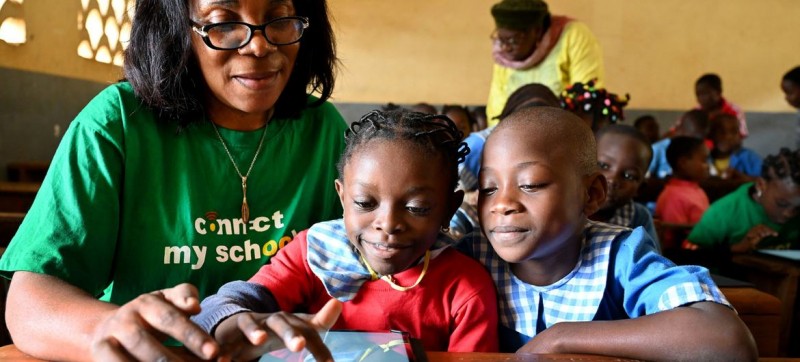Young girls at a school in Yaoundé, the capital of Cameroon use a tablet during a lesson. More and more young women and girls are highlighting the importance of access and safety in the digital world. Marking International Girls in ICT Day, on Thursday, UN agencies have issued a call to action to ensure equal access to digital learning opportunities. The International Girls in ICT Day is observed annually during the last week of April, and this year the focus is on ‘Access and Safety’ as key elements to engage the next generation with information and communication technology (ICT). According to the UN International Telecommunication Union (ITU), this year’s theme “reflects the world’s shared interest in empowering youth and girls to safely benefit from an active digital life. The UN agency recognizes the need to ensure girls and women enjoy equal access to digital learning opportunities, particularly in least developed countries.Fair and equal
Girls continue to face systemic barriers, cyber bullying and threats, and a lack of access due to the digital divide.
This #GirlsinICT Day, let's transform tech and innovation to be equitable, safe and accessible. pic.twitter.com/rxPkWWUlxu
— Amina J Mohammed (@AminaJMohammed) April 28, 2022
Worldwide only 30 per cent of tech science and technology professionals are women. And according to ITU’s latest data, globally, just 57 per cent of women use the Internet, compared to 62 per cent of men.
Furthermore, if women are unable to access the Internet and do not feel safe online, they are unable to develop the necessary digital skills and engage in digital spaces, which diminishes their opportunities to pursue careers in science, technology, engineering, and mathematics (STEM) related fields, ITU continued.
Inspire the next generation
“Girls in ICT Day is a call to action to inspire the next generation of young women and girls to enter STEM careers,” said ITU Secretary-General Houlin Zhao.
Calling on all government, business, university leaders and others, to do their utmost to support young women and girls, Mr. Zhao said that is essential to “give them the chance to achieve their dreams.”
Girls’ access to STEM is crucial
Joining the call, UN Women reiterated the importance of ensuring every girl has safe and meaningful access to digital technology and ICTs.
In a statement marking the Day, the agency said they were inspired by young activists such as 18-year-old Ana Vizitiv from the Republic of Moldova, whose work promotes gender equality in ICT and STEM, and by role model and entrepreneur 20-year-old Yordanos Genanaw from Ethiopia, who participated in the African Girls Can Code initiative and is now developing a website and coaching others.
“These young women are using their skills to inspire other girls to pursue coding and basic IT skills, regardless of gender biases”, the statement continued.
Reminding that girls’ access to, and engagement in STEM subjects, is more crucial now than ever – especially after the COVID-19 pandemic and multiple crises in countries across the world have created repeated challenges to young women and girls to learn, earn and connect – UN Women reiterated the importance of technology as a solution to access essential services and information.

Adolescent girls use cellphones and tablets in the Za’atari camp for Syrian refugees (file).
Technology also helps them communicate in school, keep in touch with friends and relatives and as a key aspect of their autonomy and future prospects.
Persistent negative stereotypes
A recent study by UN Women and ITU shows that girls access digital technology at a later age than boys, and that their use of this technology is more often curtailed by their parents.
In addition, young women and girls are disproportionately exposed to online and ICT-facilitated violence and harassment, which can negatively impact their physical, mental, and emotional well-being, and influence how they access and use digital tools for the rest of their lives, UN Women added.
Built upon the idea that “every girl has the right to be connected and safe, and to play her part in shaping a more equal, green and tech-driven future”, the UN Secretary-General has called for a global digital compact for improved digital cooperation.
The Generation Equality Action Coalition for Technology and Innovation for Gender Equality is bringing together governments, tech companies, the UN System, civil society organizations and young people, for a more equal and diverse digital transformation, including by preventing and eliminating online gender-based violence.
Marking the Day, UN Deputy Secretary-General Amina Mohammed called for an end to systemic barriers: “Girls continue to face cyber bullying and threats, and a lack of access due to digital divide”, she said on Twitter, asking for a transformation in tech and innovation, to be “equitable, safe and accessible”.
Across the UN system, agencies spoke up for gender equality in STEM. The UN cultural agency UNESCO called for the empowerment of young girls in ICT, so they can have a future lead in the workplace. The UN refugee agency mentioned the importance of not forgetting the digital access for refugees, and the Food and Agriculture Organization (FAO) reiterated the need to guarantee better access to digital technologies, for rural women and girls.
Join the digital revolution
The global celebration and associated worldwide Girls in ICT Day events underline ITU’s commitment to encourage girls and young women everywhere to consider pursuing STEM career paths.
To date, over 600,000 girls and young women have taken part in more than 12,000 celebrations of Girls in ICT Day in 195 countries worldwide.
“All over the world, girls and young women want to join the digital revolution. When we remove barriers of access and safety, women and girls can make remarkable contributions to, and be empowered by, ICTs. To put it simply: tech needs girls, and girls need tech,” said Doreen Bogdan-Martin, Director of ITU’s Telecommunication Development Bureau.”




Comments are closed.